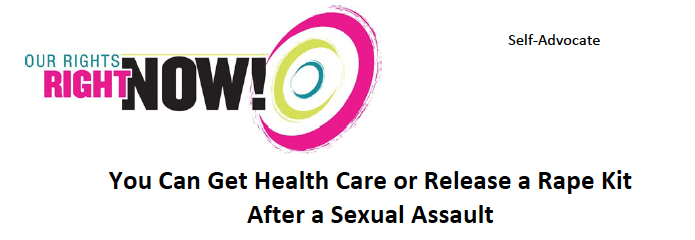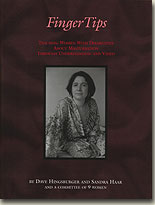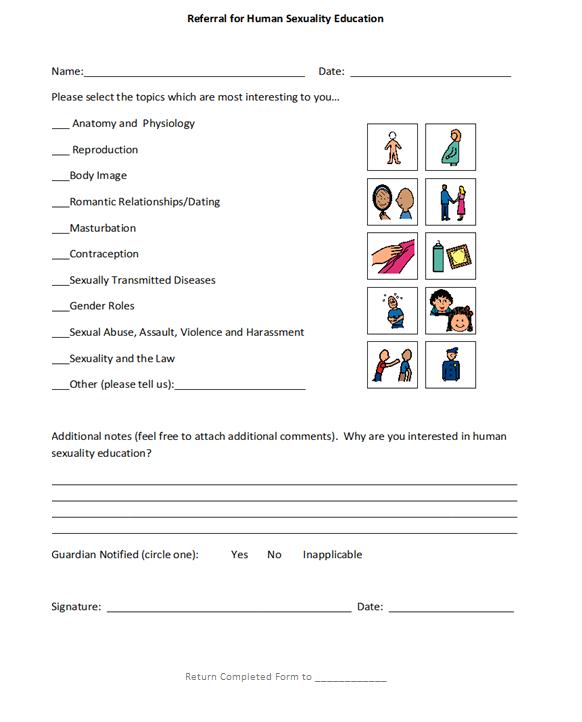The Stanford Intellectual and Developmental Disabilities Law and Policy Project released a report focused on the Capacity to Consent to Sexual Activity among Those with Developmental Disabilities (link takes you to the page where you can freely download the report). The report provides historical background, the current state of the field, and capacity definitions. There are no federal statutes defining sexual assault and consent – each state has its own statutes. The report highlights six standards for consent used in various states: morality, nature and the consequences, totality of the circumstances, nature of the conduct, judgement, and evidence of disability. The Rape, Abuse & Incest National Network (RAINN) provides easy access to the laws in each state (link takes you to their state law finder). As wording in state statutes can be vague, judicial decisions help provide guidance for interpreting the statutes. The report from Stanford Intellectual and Developmental Disabilities Law and Policy Project provides summaries of judicial decision for each state. This report is an important tool for both victim rights and sexual autonomy advocates.
policy
New Laws Regarding Guardianship and Access Sexual Violence Services
 Thank you to Kelli at the Developmental Services Center for sending out this information! Over the past three years, three laws have been passed that improve public policy with the goal of increasing access to services for women with disabilities who experience sexual violence:
Thank you to Kelli at the Developmental Services Center for sending out this information! Over the past three years, three laws have been passed that improve public policy with the goal of increasing access to services for women with disabilities who experience sexual violence:
P.A. 96-318, eff. Jan. 1, 2010- Consent of a guardian, health care surrogate or health care power of attorney is not required in order for a victim with a disability to receive health care or release forensic evidence following a sexual assault.
If a victim with a disability is unable to consent to the release of evidence, and the victim’s guardian, health care surrogate or health care power of attorney is unavailable or unwilling to release the information, an investigating law enforcement officer may release the evidence.
P.A. 96-1010, eff. Jan 1, 2011- An adult with a guardian can:
- decide whether his or her guardian can look at her/his rape crisis center records; and
- decide whether or not to waive the rape crisis center privilege.
P.A. 97-165, eff. Jan. 1, 2012- An adult with a guardian can attend up to five, forty-five minute counseling sessions without the consent of, or notice to, the guardian unless the counselor or therapist believes such disclosure is necessary.
Click the link below to download fact sheets created for advocates and self-advocates
Public Policy Committee Fact Sheets 6.12.12
These fact sheets are a product of the Illinois Imagines Project, a collaborative among the Illinois Department of Human Services, the Illinois Coalition Against Sexual Assault, and self-advocates for people with disabilities.
Thank you to these groups who not only created these facts sheets but also advocated for these protections!
Sexuality Education Policy- An Example
I know many of you are interested in writing a sexuality policy for your agency to help guide decisions around teaching human sexuality. Here is an example I thought might be helpful from Florida’s disability council.
What I really like about this policy is that they organized it around student responsibilities and educator responsibilities. I think this is a nice model for conceptualizing a sexuality policy. Below, I’ve highlighted the “Quick Reference Fact Sheet on Choice and Education Instruction” which is part of the policy.
Impact: A Newsletter
A workshop participant put me in touch with this awesome resource (thanks Cate!). Impact is a newsletter from the University of Minnesota’s Institute on Community Integration which is part of their Center for Excellence in Developmental Disabilities. They have many products and services that you may find useful (many of which are available online or at little cost). Their newsletters contain ” strategies, research, and success stories in specific focus areas related to persons with intellectual, developmental, and other disabilities. ”
The sexuality issue has several interesting articles written by individuals with disabilities, service providers, family, and community members. In addition to the articles, the newsletter provides information about additional resources in several areas: education, parent support, advocacy, sexual health, and sexual safety.
The story in Impact that touched me the most was one about two men who were harshly punished for their love for one another while institutionalized but were finally able to be married. Once they were both living in group homes and reunited…”they decided they would not live together, they would not have sex, until they were married. They had been punished so often, told continuously that they were dirty, sinful, hateful creatures, that they needed to get married ‘liked other people.'” Dave Hingsburger* commented “How we hate the hearts of people with disabilities! We have caged their bodies, disfigured their genitals, drugged their thoughts. But we have never, ever captured their hearts or controlled their spirits.”
*The link in the text is to Dave Hingsburger’s blog. He is the author of several resources for teaching human sexuality and abuse prevention to individuals with intellectual and developmental disabilities. The resources can be found at Diverse City Press.
Sex Ed in the News
 ABC just did an article about teaching human sexuality to students with intellectual disability. They focus on a New York school that has incorporated teaching sexuality into their mission. One of my favorite lines from the article is that “Sex ed is not a goal, but a process.” They mention in the article that New York City schools mandate sexuality education and I just wanted to comment on this, based on my experience in Illinois.
ABC just did an article about teaching human sexuality to students with intellectual disability. They focus on a New York school that has incorporated teaching sexuality into their mission. One of my favorite lines from the article is that “Sex ed is not a goal, but a process.” They mention in the article that New York City schools mandate sexuality education and I just wanted to comment on this, based on my experience in Illinois.
Although there is not specific information that addresses the willingness of school administrations to offer comprehensive sexuality education to individuals with ASD, there is information available for offering this type of education in general. As part of the Affordable Health Care Act federal funding was opened up for comprehensive sexuality education called PREP- Personal Responsibility Education Program as well as Title V- abstinence only education meaning that states get to choose the type of sexuality education offered and may offer both (SIECUS, n.d.). For fiscal year 2010, 43 states applied for PREP funding which means their sexuality education must cover abstinence, contraception use, healthy relationships, adolescent development, finical responsibility, educational and career success, and healthy life. Until PREP funding was aproved funding was only available for Title V abstinence only education.
Even if comprehensive sexuality education is being offered in the schools, that does not mean it is being offered to individuals with disabilities. Under the Individuals with Disabilities Education Act, students with Individual Education Plans have access to adapted general education curriculum. At this point, my understanding is that, in Illinois this means a student can participate in a general education sexuality class room unsupported, with an aide, or opt out. If the student (or more accurately, the student’s guardian), opts out, then the child’s special educator is required to adapt the curriculum with parental permission. There are no standards for what that adaptation must cover. Teachers may be working with professionally developed curriculum for individuals with disabilities, independently adapting a general education curriculum, or may be creating their own curriculum from scratch. Due to the diverse needs and strengths among individuals with students with disabilities there may be great variability in how long it takes to cover various topics, to what depth topics can be covered, and what further adaptations may be needed.
Implementing Sexuality Education
When you think about implementing sexuality education, it is important to think of what your agency is already doing because it is often easier to build on something than to start from scratch.
I’m going to present a model for one approach for implementing sexuality education at the agency level. This isn’t the only way to do this, but rather a suggestion of one path that I have found to be successful. Your agency may already have completed some phases or find some phases to be unnecessary.
Phase I: Start a committee- bring together a few people who are interested in topics of human sexuality and willing to do some of this work.
Phase II: Draft a sexuality policy- this will serve as a foundation the committee’s path.
Phase III: Invest in curriculum and teaching materials- you don’t need much to start out with, but I think it’s helpful to have something and you can always add later. Having said that, I’ve never come across anything that didn’t need some adaptation.
Phase IV: Start thinking about who you want to target and how- do you want to do small groups or individual education? Who is going actually implement the education and what support do they need (training, regular meetings to process how it’s going)? What will your process be for getting individuals receiving services involved? (I’ve attached a sample Referral Form).
Phase V: Start Implementing!
Phase VI: Expand and Revise- self advocates, expanding curriculum, increasing training for all employees…there’s so many interesting and fun places you can go.
You may be saying to yourself, “this is great, but I’m not really in a position to implement agency wide change where I work”. Here are some questions to ask yourself in regards to what you can do at a personal level.
- Where could I fit in with what my agency is already doing?
- How can I reinforce and incorporate human sexuality concepts into my everyday interactions?
- How can I incorporate human sexuality concepts into programing?
- What can I do to advocate for human sexuality education?
Supporting People with Disabilities with BEING Sexuality Educators
What does supporting people with disabilities with BEING sexuality educators?
It’s all about self-advocacy!
According to SDC (UIC’s Institute on Disability and Human Development and their Sexuality and Disability Consortium (SDC), “Sexual Self-Advocacy means: People with disabilities taking control of their own sexuality by making their own decisions and speaking up for themselves and others about sexuality.”
As sexuality educators, individuals with disabilities can be…
- Safe people for their friends to talk to
- Knowledgeable sources of information
- Leaders and co-leaders in educational sessions
- Models of healthy sexual relationships
- Advocates for raising awareness about sexuality topics
- Fill in the blank ____________
This is a great webinar to learn more about how to advance sexual self-advocacy for people with disabilities.
Another great resource for learning more about sexual self-advocacy is The Green Mountain Self-Advocates. They have developed materials for self-advocates interested in teach human sexuality (as well as many other topics).
SDC recommends the Developmental Disabilities and Sexuality Curriculum which has a self-advocacy component built in.
Hierarchy: Masturbation Training by Lisa Mitchell
Below is a “Hierarchy: Masturbation Training” by Lisa Mitchell, LCSW-R at Penn State. Her plan for what she calls, “private touching”, was specifically developed for individuals with Autism Spectrum Disorders, but I think it is a good general framework. The hierarchy goes from lowest level of support to highest level of support. Across the board, masturbation is a topic people want more information about. I think this is a nice way to think about what kind of education or training is available as well as what you might want to try before moving on to something more intensive. I have also included a link to her entire powerpoint. She covers other topics/tips you may find interesting (relationship checklist, key concepts for topic areas, teaching techniques, problem behaviors).
- When appropriate, work with families and/or residence to establish a visual “private time schedule.”
- When appropriate, supply individual with lubricant, explaining that it is for use during “private time.”
- Meet with individual. Present illustrations of same sex persons masturbating, in conjunction with verbal explanation regarding technique.
- Meet with individual. Use illustrations and anatomical model in conjunction with verbal explanation of technique.
- Meet with individual. Use anatomically correct dolls to demonstrate appropriate masturbatory technique, in conjunction with verbal explanation.
- When appropriate, supply masturbatory aids such as body pillows, magazines, collages of stimulating pictures, vibrating pillows, masturbation sleeves, masturbation pumps, or vibrators. Explain safe usage of such aids.
- Meet with individual. Arrange for multiple viewings (when necessary) of instructional masturbation movies “Handmade Love” for males, or “Fingertips” for females
 . Viewings should occur in the individual’s bedroom or the private location where masturbation will be allowed to occur. Trainer may need to supply a verbal explanation while simultaneously viewing the tape to reinforce principles. (I would have the person watch on their own before feeling the need to view with another present. In general I think the videos are very good but very explicit. You could use the video in place of the verbal instructions indicated in the hierarchy).
. Viewings should occur in the individual’s bedroom or the private location where masturbation will be allowed to occur. Trainer may need to supply a verbal explanation while simultaneously viewing the tape to reinforce principles. (I would have the person watch on their own before feeling the need to view with another present. In general I think the videos are very good but very explicit. You could use the video in place of the verbal instructions indicated in the hierarchy). - For individuals with more significant challenges, consider use of ABA type
approach (preferably done with relatively unfamiliar trainer) to teach more
successful masturbatory technique. Shape up steps one at a time (e.g. “Pull pants
and underwear down”, “Lay on belly”, “Put pillow between legs”, “Rock from side to
side”. Or “Pull pants down”, “Sit on bed”. “Put fingers around penis”, “Rub up and
down, up and down.”) – I have heard of this method, but I do not know anyone personally who has ever instructed on masturbation at this level. I would want to have a very comprehensive plan on how this would be implemented, full team support, and special attention paid to protecting the individual being instructed and the person doing the instruction.
Introduction to Sexuality Education for Individuals Who Are Deaf-Blind and Significantly Developmentally Delayed
 I found this great (free) book online. Although it targets parents, caregivers, and professionals who work with individuals who are deaf-blind and significantly developmentally delayed- you may find useful info even if this not your target population. Kate Moss & Robbie Blaha’s overall approach to education considers four basic tools for instruction: routines, units, teachable moments, and behavior plans. Chapters include …
I found this great (free) book online. Although it targets parents, caregivers, and professionals who work with individuals who are deaf-blind and significantly developmentally delayed- you may find useful info even if this not your target population. Kate Moss & Robbie Blaha’s overall approach to education considers four basic tools for instruction: routines, units, teachable moments, and behavior plans. Chapters include …



